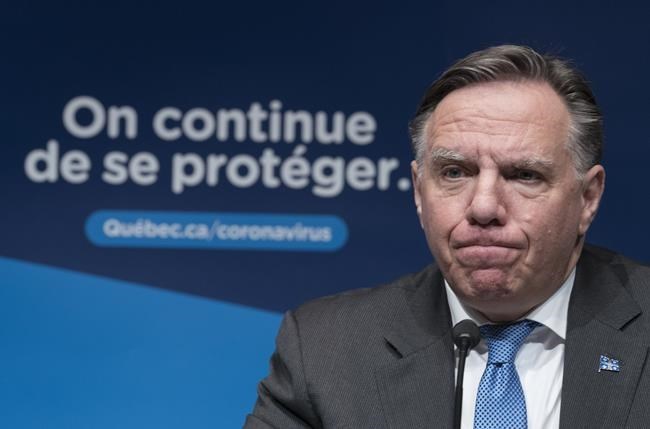MONTREAL — Civil rights advocates on Thursday expressed concern Quebec's new provincewide curfew is not justified by science and will be enforced in a way that will have a disproportionate impact on racialized people and the vulnerable.
Premier Francois Legault said he will impose a curfew between 8 p.m. and 5 a.m. beginning Saturday and until Feb. 8 in order to stop people from socializing and spreading COVID-19. Exceptions will be made for some, including people travelling to or from essential jobs or walking dogs near their homes.
The executive director of the Canadian Civil Liberties Association described a curfew as an "extraordinary" measure that is usually applied to criminals and high-risk offenders on bail.
Michael Bryant said he fears the measure could lead to overzealous ticketing and arbitrary police stops that have been shown in the past to excessively target people who are Black, Indigenous, homeless or poor. He said arbitrary street checks will also hurt vulnerable people who don't have stable housing or stable working hours.
"I think you're going to see people were being ticketed, basically, for being poor and homeless, not because they're a public health risk," he said.
Bryant said the government should provide data proving a curfew is necessary and effective before imposing such a significant limit on people's liberties. That information, he explained, is also part of the criteria used to determine whether an order is constitutional.
Naveed Hussain, a nurse at the McGill University Health Centre, says many health-care workers are at risk of being stopped by police because they are racialized and work late hours. He said he's hopeful, however, that interactions between people of colour and the police will go smoothly after the curfew enters into effect.
“I'm really hopeful that we can come to an understanding that everything will work out in a positive way,” he said in an interview Thursday.
Deputy Premier Genevieve Guilbault told reporters Thursday the rules apply to everyone regardless of background, adding that anyone on the street after 8 p.m. should be prepared to face police questioning. She pointed out that Montreal police have taken steps to reduce racial profiling, citing a policy unveiled last summer.
Police will show tolerance towards the homeless, who will be directed to shelters rather than ticketed, she said.
The president of a Quebec-based civil rights group, meanwhile, questioned why the government was blaming citizens for the spread of COVID-19 instead of its own failed policies. Alexandra Pierre of the Ligue des droits et libertes said in a statement that it's the role of government to properly ventilate public buildings, to efficiently test and trace cases, to vaccinate seniors rapidly and to improve conditions for health-care workers.
"When we know that at least 30 per cent of outbreaks occur in schools and a large part in hospitals, what justifies such a drastic and restrictive measure of the freedom of movement of the population?" she said.
"The curfew has been imposed in France, Spain, some states in the United States … has it really worked so far?"
On Wednesday, the province's public health director admitted that there was no "controlled study" proving that curfews work, because, he said, they're usually implemented along with other measures. But Horacio Arruda defended the decision, saying too many Quebecers had gathered over the holidays, contributing to a rise in cases.
"At some point, you have to be able to take measures that, together, will diminish the probability of gatherings or contacts," he said.
Montreal epidemiologist Christopher Labos says that while it's hard to prove which measures work best against the virus, he says he believes a curfew could help discourage gatherings and sends a message about the seriousness of the pandemic.
"It's part of the general concept of getting people to stay home," he said in a phone interview Thursday.
Montreal hospitals, he added, are becoming overwhelmed and will soon run out of resources to treat patients if the province doesn't take action to reverse the trend.
This report by The Canadian Press was first published Jan 7, 2021.
Morgan Lowrie, The Canadian Press



